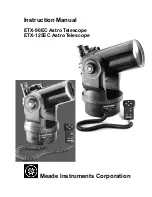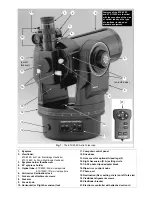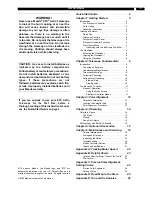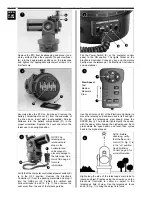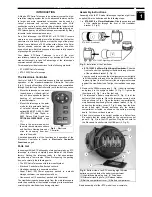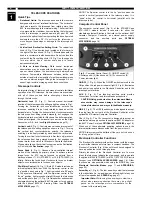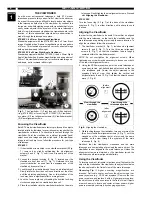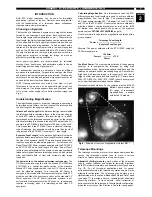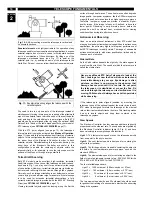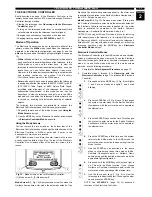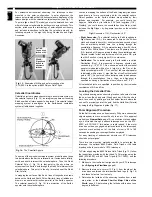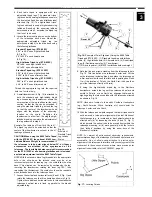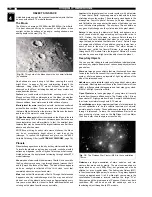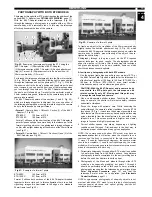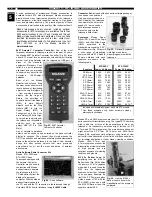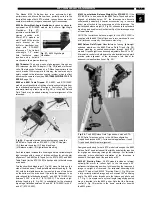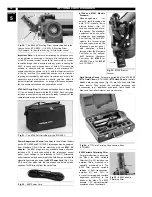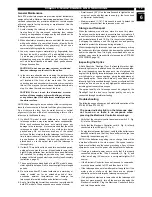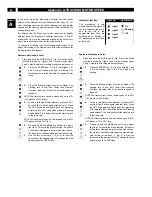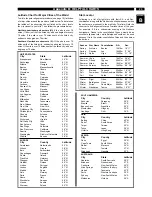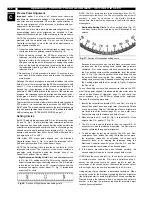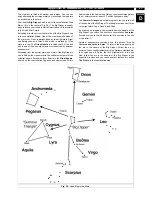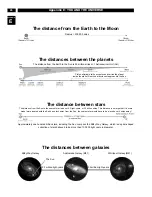
12
Chapter 3: POLAR ALIGNMENT
APTER
3
For extensive astronomical observing, the telescope is best
mounted in the polar configuration. In polar alignment the
telescope is oriented so that the horizontal and vertical axes of the
telescope align with the celestial coordinate system (see Fig. 11).
To polar align either ETX model you must understand how and
where to locate celestial objects as they move across the sky. This
section introduces the terminology of polar-aligned astronomy,
and includes instructions for finding the celestial pole and for
following objects in the night sky using Declination and Right
Ascension.
Celestial Coordinates
Celestial objects are mapped according to a coordinate system on
the celestial sphere (Fig. 14), an imaginary sphere surrounding
Earth on which all stars appear to be placed. This celestial object
mapping system is analogous to the Earth-based coordinate
system of latitude and longitude.
The poles of the celestial coordinate system are defined as those
two points where the Earth’s rotational axis, if extended to infinity,
north and south, intersect the celestial sphere. Thus, the North
Celestial Pole (1, Fig. 14) is that point in the sky where an
extension of the Earth’s axis through the North Pole intersects the
celestial sphere. This point in the sky is located near the North
Star, Polaris.
In mapping the surface of the Earth, lines of longitude are drawn
between the North and South Poles. Similarly, lines of latitude are
drawn in an east-west direction, parallel to the Earth’s equator.
The celestial equator (2, Fig. 14) is a projection of the Earth’s
equator onto the celestial sphere.
Just as in mapping the surface of the Earth, imaginary lines have
been drawn to form a coordinate grid for the celestial sphere.
Object positions on the Earth’s surface are specified by their
latitude and longitude. For example, you could locate Los
Angeles, California, by its latitude (+34°) and longitude (118°).
Similarly, you could locate the constellation Ursa Major, which
includes the Big Dipper, by its general position on the celestial
sphere:
Right Ascension: 11hr; Declination: +50°.
• Right Ascension: The celestial analog to Earth longitude is
Right Ascension (R.A.). It is measured in time on the 24-hour
clock and shown in hours (hr), minutes (min) and seconds (sec)
from an arbitrarily defined zero line passing through the
constellation Pegasus. R.A. coordinates range from 0hr 0min
0sec to 23hr 59min 59sec. Thus there are 24 primary lines of
R.A., located at 15-degree intervals along the celestial equator.
Objects located further and further east of the prime R.A. grid
line (0hr 0min 0sec) carry higher R.A. coordinates.
• Declination: The celestial analog to Earth latitude is called
Declination (Dec.). It is measured in degrees, minutes, and
seconds (e.g., 15° 27' 33"). Dec. shown as north of the celestial
equator is indicated with a plus (+) sign (e.g., the Dec. of the
North celestial pole is +90°). Dec. south of the celestial equator
is indicated with a minus (–) sign (the Dec.of the South celestial
pole is –90°). Any point on the celestial equator (which passes
through the constellations Orion, Virgo, and Aquarius) is
specified as having a Declination of zero, shown as 0° 0' 0".
All celestial objects are specified in position by their celestial
coordinates of R.A. and Dec.
Locating the Celestial Pole
To get basic bearings at an observing location, take note of where
the sun rises (East) and sets (West) each day. After the site is
dark, face north by pointing your left shoulder toward where the
sun set. To precisely point at the pole, find the North Star (Polaris)
by using the Big Dipper as a guide (Fig. 17).
Polar Alignment Procedure
As the Earth rotates once on its axis every 24 hours, astronomical
objects appear to move across the sky in an arc. This apparent
motion (see Sidereal Rate, page 10) is not obvious to the unaided
eye, but viewed through a serious telescope such as the ETX-
90EC or ETX-125EC, this motion is rapid indeed. If the motor
drive has not been engaged, objects centered in the telescope’s
eyepiece move entirely out of the field of view in 30 to 160
seconds, depending on the magnification employed.
For easy tracking of astronomical objects your ETX telescope
should be polar aligned.
There are two mounting methods available to polar align the
telescope: the optional #883 Deluxe Field Tripod or the table
tripod specific to your model of ETX telescope.
To Polar align using the #883 Deluxe Field Tripod (Fig. 13), follow
the instructions provided with the tripod. To Polar align using the
#880 (ETX-90EC) or #881 Table Tripod (ETX–125EC), use the
following procedure.
1. Make sure the viewfinder is aligned with your ETX telescope
(see Aligning the Viewfinder, page 8).
2. Remove the two hole covers (13, Fig. 1) from the side of the
drive base and thread the two identical fixed legs (4, Fig. 16)
into these holes to a firm feel only.
3. Determine the latitude of the observing location from a road
map, atlas, or the Latitude Chart for Major Cities of the
World, page 23; determining the latitude within about one
degree is sufficient.
Fig. 13: Examples of Alt/Az and polar mounting of an
ETX-90EC to the optional #883 Deluxe Field Tripod.
ALT/AZ:
Tripod head
locked at 90°
POLAR:
Tripod head
locked at
observer’s
latitude
Fig.14: The Celestial Sphere.
2
1

